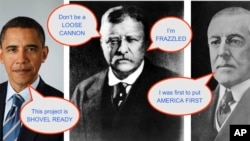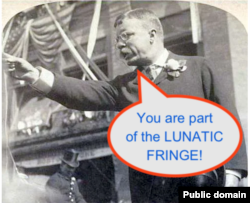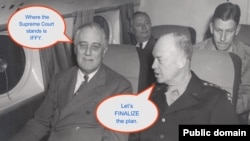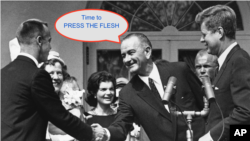When America’s leaders can’t think of the perfect word for certain situations, they sometimes make one up. And those new words often go down in history.
From “lunatic fringe” (Teddy Roosevelt) and “iffy” (Franklin D. Roosevelt)
to “snowmageddon” (Barack Obama) and “bigly” (Donald Trump), the terms coined by U.S. presidents are as unique as the American experience.
“We're really creating our own institutions through language,” says Paul Dickson, author of “Words from the White House: Words and Phrases Coined or Popularized by America’s Presidents.” “So, when John Quincy Adams creates the word ‘gag rule,’ or somebody creates another word that actually fits into what we do, once you have a word for it, then it becomes a reality.”
Thomas Jefferson is said to have created more than a hundred words, including “authentication” [act of proving the accuracy or legitimacy of something] and “anglomania” [an excessive fondness for all things English].
Abraham Lincoln coined the words “relocate” and “relocation,” the metaphor “a house divided” (drawn from the Bible) in reference to the Civil War, and according to The New York Times, the word “cool” [nice, good].
Teddy Roosevelt added several memorable words and phrases to American English.
“Teddy Roosevelt creates this huge body of slang,” Dickson says. “‘Pack rat,’ ‘mollycoddle,’ ‘frazzle,’ ‘malefactors of great wealth,’ ‘loose cannon,’ ‘lunatic fringe,’ ‘bully pulpit,’ ‘pussyfooter,’ and on and on.”
Woodrow Wilson is believed to have been the first to use the slogan “America First'' in 1915. He was also criticized for being the first president to drop “the'' before “Congress.” Wilson’s successor, Warren Harding, gets credit for coming up with the term “Founding Fathers” to describe the framers of the Constitution. Harding also originated the words “normalcy” and “bloviate” [to speak bombastically or grandiosely].
Before Calvin Coolidge, no political campaigner had ever branded himself as a “law- and-order” candidate. Harry Truman devised the phrase “do-nothing Congress” and the saying, “If you can’t stand the heat, get out of the kitchen.” Lyndon Johnson was the first to call handshakes “pressing the flesh.”
The new words filled in a lot of blanks as when, in 1934, the sitting president decided his annual report to Congress needed a more fitting name.
“It was Franklin D. Roosevelt who changed the name of the ‘Report to Congress’ to the ‘State of the Union,’ and that was a much better description of what was going on than a ‘Report to Congress,’” Dickson says.
Inventing new words drew the ire of critics who felt presidents should stick to proper English, like when FDR used “iffy” for the first time.
“He said, ‘Well, it's pretty iffy as to where the Supreme Court stands on this,’ and that made headlines: ‘Roosevelt created the word ‘iffy’!’” Dickson says.
The Oxford English dictionary also cites FDR as being the first to use the word “cheerleader” [a person who leads the cheering at a sporting or special event].
Dwight D. Eisenhower is admired for conceiving the term, “military-industrial complex” in 1961, to warn against the powerful alliance of the military, government and private corporations. But he was slammed for uttering another word in a speech.
"He used the word ‘finalize’ — taking ‘final’ and turning it into a verb — and there was this huge outcry. There were editorials in the major papers that the president shouldn't use a word like finalize. It wasn't proper English,” Dickson says.
Critics called the word nonexistent," "hideous," "atrocious" and "meaningless."
Dickson says necessity is the reason presidents continue to devise new words.
“They come up when they’re needed … to deal with the times, to deal with what was going on, whether it be the Great Depression or whether it be World War II, or whether it's the change in fashion or politics,” he says. “President [Richard] Nixon coming up with the word ‘solid majority,’ or President Obama talking about certain projects which were ‘shovel-ready,’ that had never been heard before, that meant that they could immediately start working on the project.”
Obama’s predecessor, George W. Bush, is remembered for calling himself the “decider” [person who makes the final call] and using the word “misunderestimate” [to seriously underestimate.]
While the presidential expressions that have entered the American lexicon are wildly diverse, there might be one quality the presidents share.
“A number of them showed great cleverness. That's what they have in common. They were not just smart. They were clever. They were witty,” Dickson says. “They often have to think on their feet, and when they think on their feet, sometimes there isn't an existing word to say what they mean. And they just make one up.”







